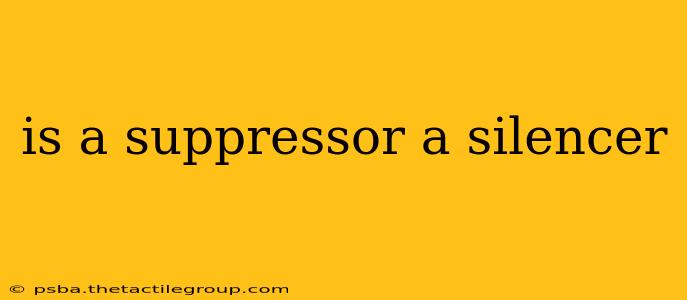The terms "suppressor" and "silencer" are often used interchangeably, leading to confusion. While they refer to the same device, the preferred and more accurate term is suppressor. This article will delve into the reasons behind this terminology shift, explore how suppressors work, and address common misconceptions surrounding their effectiveness.
Why "Suppressor" is the Preferred Term
The term "silencer" is misleading. Suppressors don't silence firearms completely; they significantly reduce the sound. The reduction in noise is substantial, but a gunshot will still be audible. The term "suppressor" more accurately reflects the device's function: it suppresses, or reduces, the sound of a gunshot. This more precise terminology avoids the unrealistic expectation of complete silence.
How Suppressors Work: The Science of Sound Reduction
Suppressors work by slowing down and expanding the gases produced by the firing of a cartridge. This process involves several key components:
1. Baffles: The Core Technology
A suppressor consists of a series of internal baffles. These baffles are strategically designed chambers that create a labyrinthine path for the expanding gases. As the gases travel through these chambers, their pressure and velocity are gradually reduced. This expansion and slowing significantly lessen the intensity of the sound waves produced.
2. Expansion Chambers: Reducing Pressure
The expansion chambers within the baffles increase the volume of the gas, further decreasing its pressure. Lower pressure translates directly to a quieter gunshot.
3. Material Selection: Optimizing Performance
The materials used in constructing suppressors play a vital role in their effectiveness. Typically, suppressors are made from durable materials such as stainless steel or titanium, chosen for their heat resistance and longevity.
Misconceptions about Suppressors
Several misconceptions surround suppressors:
Myth 1: Suppressors Make Firearms Completely Silent
As mentioned earlier, suppressors significantly reduce the sound of a gunshot, but they don't eliminate it entirely. The level of sound reduction varies depending on the firearm, ammunition, and suppressor design.
Myth 2: Suppressors Are Only for Military and Law Enforcement
Suppressors are legally available to civilians in many countries (with appropriate licensing and regulations). Their uses range from recreational shooting to hunting and even self-defense.
Myth 3: Suppressors Are Difficult to Use and Maintain
Modern suppressors are relatively easy to use and maintain. Regular cleaning is important, but the process is generally straightforward.
The Importance of Legal Compliance
It's crucial to remember that the ownership and use of suppressors are subject to strict regulations. Always comply with all applicable federal, state, and local laws regarding the purchase, possession, and use of suppressors. Failure to do so can result in serious legal consequences.
Conclusion: Suppressors, Not Silencers
In conclusion, while the term "silencer" is commonly used, "suppressor" is the more accurate and technically correct term. These devices offer substantial sound reduction, but they don't render firearms completely silent. Understanding their functionality, legal implications, and common misconceptions is crucial for anyone interested in learning more about these accessories. Remember to always prioritize responsible firearm ownership and adhere to all relevant laws and regulations.

